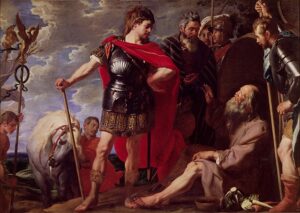[36] ταῦτα δὲ λέγοντος τοῦ Διογένους, περιίσταντο πολλοὶ καὶ πάνυ ἡδέως ἠκροῶντο τῶν λόγων. ἐννοήσας δὲ οἶμαι τὸ τοῦ Ἡρακλέους, τοὺς μὲν λόγους ἀφῆκε, χαμαὶ δὲ καθεζόμενος ἐποίει τι τῶν ἀδόξων. εὐθὺς οὖν οἱ πολλοὶ κατεφρόνουν αὐτοῦ καὶ μαίνεσθαι ἔφασαν, καὶ πάλιν ἐθορύβουν σοφισταί, καθάπερ ἐν τέλματι βάτραχοι τὸν ὕδρον οὐχ ὁρῶντες.
- Map
- Pre Reading
- Post Reading
- Culture Essay
n/a
Find words and phrases that depict Diogenes and other sophists at the Isthmian festival.
| Other sophoi | Diogenes | |
| Physical appearance and dress
|
||
| Charismatic magnetism
|
||
| Antagonists
|
||
| Models of action
|
||
| Xenia network
|
Tell, Håkan. “Sages at the Games: Intellectual Displays and Dissemination of Wisdom in Ancient Greece.” Classical Antiquity 26.2 (2007) 249-75.
